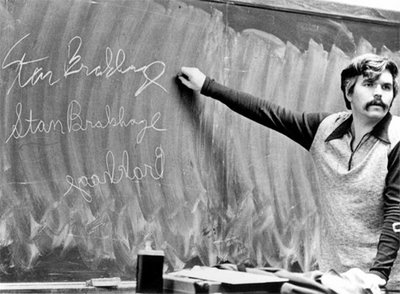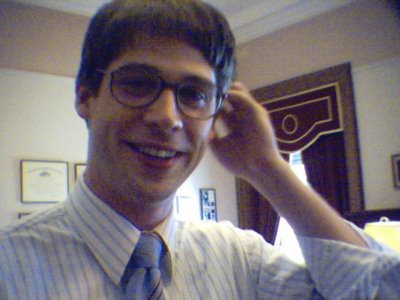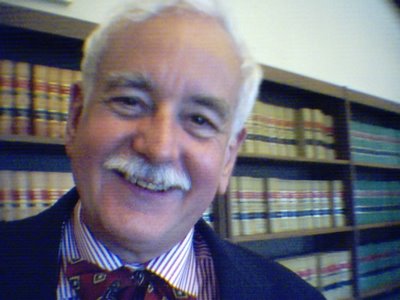 I recently reviewed Stan Brakhage: Filmmaker, David James's new collection of essays on Stan Brakhage, for Senses of Cinema. The review appears here.
I recently reviewed Stan Brakhage: Filmmaker, David James's new collection of essays on Stan Brakhage, for Senses of Cinema. The review appears here.
Monday, July 31, 2006
Stan Brakhage Reader Review
 I recently reviewed Stan Brakhage: Filmmaker, David James's new collection of essays on Stan Brakhage, for Senses of Cinema. The review appears here.
I recently reviewed Stan Brakhage: Filmmaker, David James's new collection of essays on Stan Brakhage, for Senses of Cinema. The review appears here.
July 28-29, 2006: From the Temple of Justice to the Fortress of Solitude
 Our last week in Olympia began with a party, our first and last in the little stucco house on Bigelow Street. The weekend was hot and dry, and a pair of trees down the street framed the Lakefair fireworks like a proscenium. They weren't so impressive as all that - or perhaps I'm jaded after NYC - but it seemed a bit like they were sending us off. Unfortunately, I didn't get any pictures. So above you see me in the new glasses Carrie found for me at the Goodwill. They look just like Opu's. And the coke-bottle lenses are quite appropriate, if only metaphorically.
Our last week in Olympia began with a party, our first and last in the little stucco house on Bigelow Street. The weekend was hot and dry, and a pair of trees down the street framed the Lakefair fireworks like a proscenium. They weren't so impressive as all that - or perhaps I'm jaded after NYC - but it seemed a bit like they were sending us off. Unfortunately, I didn't get any pictures. So above you see me in the new glasses Carrie found for me at the Goodwill. They look just like Opu's. And the coke-bottle lenses are quite appropriate, if only metaphorically. I was up all night Thursday finishing my last opinion for Justice Sanders, who pronounced it "pretty good." From him, that's high praise, and much appreciated. And it was a relief to know I left him all caught up. The judge's comments are often spare, but always incisive. Looking back over what I wrote for him this year, I was pleasantly surprised to realize how much better I've gotten. On Friday, Justice Sanders took the office out to lunch, then Sylvia organized coffee and cake in the afternoon, where I took some pictures. Here you see Justice Sanders in the middle and my co-clerk Marcin Grabowski on the left.
I was up all night Thursday finishing my last opinion for Justice Sanders, who pronounced it "pretty good." From him, that's high praise, and much appreciated. And it was a relief to know I left him all caught up. The judge's comments are often spare, but always incisive. Looking back over what I wrote for him this year, I was pleasantly surprised to realize how much better I've gotten. On Friday, Justice Sanders took the office out to lunch, then Sylvia organized coffee and cake in the afternoon, where I took some pictures. Here you see Justice Sanders in the middle and my co-clerk Marcin Grabowski on the left. And here you see Sylvia Campbell, Justice Sanders's administrative assistance and my savior. My absent-mindedness is legendary, at least among those obliged to put up with it (ask Carrie and my brother). And Sylvia ensured I could focus on the things I actually do reasonably well (i.e. research & writing) without stepping on any landmines. Beatification seems quite appropriate. The miracle: no irremediable catastrophes.
And here you see Sylvia Campbell, Justice Sanders's administrative assistance and my savior. My absent-mindedness is legendary, at least among those obliged to put up with it (ask Carrie and my brother). And Sylvia ensured I could focus on the things I actually do reasonably well (i.e. research & writing) without stepping on any landmines. Beatification seems quite appropriate. The miracle: no irremediable catastrophes. Luckily, we landed some excellent interns this year, starting with Troy, then Kurt, and finally Wesley Hottot, whom who see above. Wesley's a UW law student. But he's originally from VA, where he worked on the VA Film Festival the year I attended. Somehow, I suspect I met him at the party at the vast old plantation house on the mountain. But I can't be sure. In any case, I only got to work with Wesley for about a month. But it was a true pleasure, as he really cares about the cases and what they stand for, and made sure even every motion to modify was just right.
Luckily, we landed some excellent interns this year, starting with Troy, then Kurt, and finally Wesley Hottot, whom who see above. Wesley's a UW law student. But he's originally from VA, where he worked on the VA Film Festival the year I attended. Somehow, I suspect I met him at the party at the vast old plantation house on the mountain. But I can't be sure. In any case, I only got to work with Wesley for about a month. But it was a true pleasure, as he really cares about the cases and what they stand for, and made sure even every motion to modify was just right. Some of the other clerks have already left, but many of those still remaining were able to attend. I didn't get a picture until the end of the party. Here you see Jessica Fogel, Grace, and Jessica from the left, and Wesley and Marcin from the right. And I close with a snapshot of Justice Sanders. Goodbye Temple of Justice. I should have cried, wanted to salute, and just walked away smiling Friday afternoon, leaving the walnut, marble, and mountains of papers behind. I miss Olympia already. And somehow I suspect I'll see it again someday. On to Alaska. Another state, another judge.
Some of the other clerks have already left, but many of those still remaining were able to attend. I didn't get a picture until the end of the party. Here you see Jessica Fogel, Grace, and Jessica from the left, and Wesley and Marcin from the right. And I close with a snapshot of Justice Sanders. Goodbye Temple of Justice. I should have cried, wanted to salute, and just walked away smiling Friday afternoon, leaving the walnut, marble, and mountains of papers behind. I miss Olympia already. And somehow I suspect I'll see it again someday. On to Alaska. Another state, another judge.
Monday, July 17, 2006
Interview with Bruce McClure

I recently interviewed filmmaker Bruce McClure for The Brooklyn Rail. We discussed how McClure makes his films, how they work, and how they've developed over the years. You can read the interview here.
Sunday, July 02, 2006
Paving Georgia in Solar Cells?
 Professor Reynolds is cautiously pollyannaish on the future of solar energy. An MIT professor working on "quantum dot photovoltaics" suggests we could supply all US energy needs by covering 2% of the continental US with photovoltaic systems working at 10% efficiency. But as Reynolds notes, "Two percent is a LOT of land." Indeed it is. The Truth Laid Bear figures it as, well, Georgia. And asks, "So: who's for paving over Georgia?"
Professor Reynolds is cautiously pollyannaish on the future of solar energy. An MIT professor working on "quantum dot photovoltaics" suggests we could supply all US energy needs by covering 2% of the continental US with photovoltaic systems working at 10% efficiency. But as Reynolds notes, "Two percent is a LOT of land." Indeed it is. The Truth Laid Bear figures it as, well, Georgia. And asks, "So: who's for paving over Georgia?"Now, I'm no mathematician. And I know less than nothing about solar energy. But I thought to do some figuring myself. My (admittedly back-of-the-envelope) calculations suggest the MIT man was asking for a bit more real estate than he needed.
About 1 kilowatt of solar energy per square meter reaches the ground. So a photovoltaic cell working at 10% efficiency (which is pretty standard, apparently) produces .1 kilowatt, or about 876 kwh per year. The US uses about 3500 billion kwh a year. Which means we'd need about 3,995,443,800 square meters, or about 4000 square kilometers of solar panels to cover current energy use. The total area of the US is 9,629,091 square kilometers, of which 9,158,960 square kilometers is land. Figuring we'd only put solar cells on land, I put 4,000 square kilometers to be about .04% of the of the United States. Or rather, a hair more than Rhode Island.
That's still a lot of solar cells. But at least it sounds remotely plausible.
Subscribe to:
Comments (Atom)